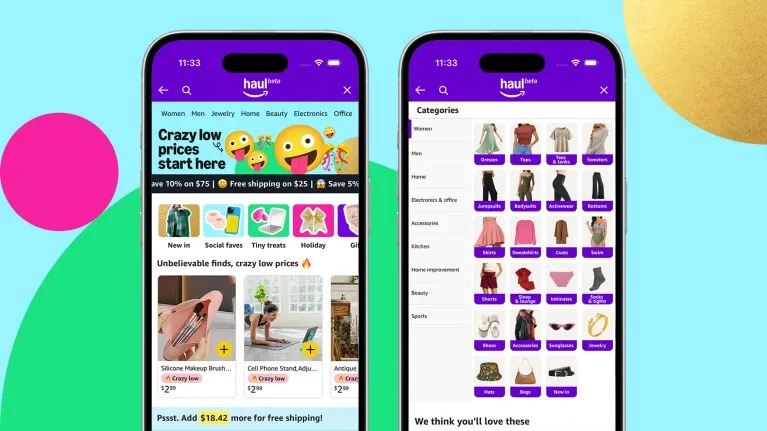Amazon has officially entered the world of budget-friendly, mass-produced e-commerce with its new platform, Amazon Haul. The initiative, designed to take on fast-growing rivals like Temu and Shein, offers ultra-low-cost items in a style that closely mimics the shopping experiences of these popular platforms. However, there’s a twist: Amazon’s take on the discount marketplace is mobile-only for now, available exclusively through the Amazon app or mobile web browser.
The ‘Amazon Haul’ Shopping Experience
In its bid to capture a slice of the growing discount marketplace, Amazon Haul offers shoppers a vast selection of affordable goods — many of which are similar to those found on Temu and Shein. These include everything from low-cost clothing (such as $16 men’s golf pants or $4.99 80s-style leg warmers) to home goods like sponges, silicone baking mats, and resistance bands. Just like its competitors, the store emphasizes budget-friendly prices, with some items being labeled with attention-grabbing emojis like rocket ships or fire, signaling limited-time deals.
Unlike Amazon’s typical product listings, which usually feature detailed descriptions, star ratings, and fast shipping information, Amazon Haul presents products in a grid layout, reminiscent of the minimalist and visually-driven style of Shein and Temu. Shipping times and ratings are only visible when you click on an item, a design choice that further aligns Amazon’s new storefront with the aesthetic of its competitors.
In Amazon’s official announcement, the company noted that while it continues to offer over 300 million items with fast, free delivery for Prime members, customer feedback revealed a desire for ultra-low-priced products, even if they come with a longer shipping window. With this in mind, Amazon Haul provides customers the opportunity to purchase goods that might take one to two weeks to arrive — a significant shift from the platform’s traditional emphasis on rapid delivery.
A Response to Temu and Shein’s Popularity
The launch of Amazon Haul comes at a time when Temu and Shein have been steadily gaining market share, particularly among Gen Z shoppers. According to research by Appfigures, Temu was the most popular shopping app in the U.S. for users aged 18 to 24, with 42 million downloads in that demographic between January and October 2024. Shein also holds a large share of this market, though its download count is lower in comparison at 14.7 million — likely because many Gen Z users already have the Shein app installed, as it has been around longer.
These Chinese-based platforms, which offer bargain-basement prices for everything from fashion to tech accessories, have exploded in popularity despite criticism regarding environmental concerns and consumer protection issues. Both companies have faced EU investigations into potential abuses of addictive design practices and the sale of unsafe or misleading products.
Amazon, however, is hoping its reputation for trustworthiness and longstanding relationships with third-party sellers will give it an edge. The company claims that sellers are vetted before being allowed to list on the Haul platform, and customers can return purchases for free within 15 days if the item costs over $3.
A Potential Risk: Tariffs and Regulatory Scrutiny
Despite its strong entry into the space, Amazon Haul faces some challenges that could impact its long-term success. One potential issue stems from the political climate surrounding Chinese imports. President-elect Donald Trump has proposed a 60% tariff on Chinese goods, which could significantly impact platforms like Temu and Shein, who rely on affordable Chinese imports to keep prices low. While this tariff is not yet a sure thing, its proposal has already attracted bipartisan attention in Washington.
In addition, the Biden administration has indicated a desire to crack down on Chinese e-commerce platforms that exploit the “de minimis exemption”, which allows products worth less than $800 to be shipped into the U.S. without incurring tariffs. This exemption has been a significant factor in enabling the ultra-low prices offered by Temu, Shein, and now Amazon Haul, making it a potential target for regulatory action in the near future.
Amazon’s Strategy: Low-Cost Goods with a Trusted Name
By introducing Amazon Haul, the tech giant is making a strategic move to compete directly with the rising popularity of Temu and Shein, which have mastered the art of offering low-cost, mass-produced goods with a distinctive shopping experience. While Amazon has always been a leader in online retail, this new venture is an acknowledgment that the discount sector is expanding, and that consumers are increasingly drawn to affordable prices — even if it means waiting a little longer for their goods to arrive.
Ultimately, Amazon Haul’s success may depend on whether it can overcome the same concerns that have dogged its competitors: long shipping times, sustainability issues, and regulatory scrutiny. However, with Amazon’s brand recognition and track record of customer service, it’s possible that the platform could carve out a niche for itself in the discount e-commerce space, even as it faces rising competition and regulatory challenges.

